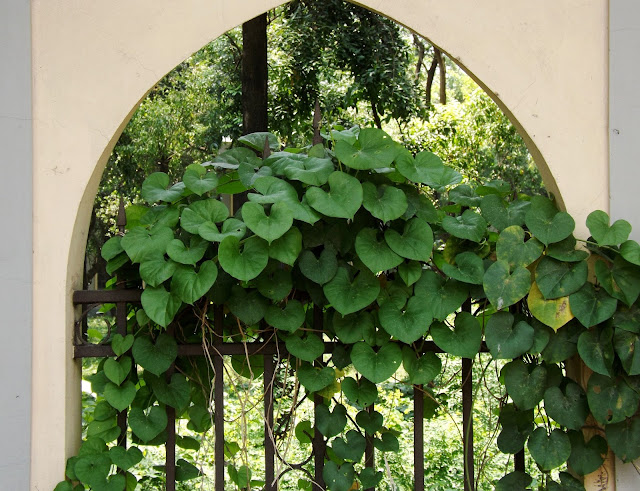Dhundul or Smooth loofah, Luffa cylindrica
Dhundul or Smooth loofah (Luffa cylindrica, family: Cucurbitaceae) is an annual extensive climber with profuse branches and tendrils. Stem is stout, glabrous and angular. As vegetables, its fruit is one of the most popular one in Bangladesh. The plant is widely cultivated in the country as commercial crops. It is found in South and Southeast Asia and other tropical areas of the world. It is probably originated in South and Southeast Asia.
Other names: Purul, Tipola (Bang); Sponge gourd, Egyptian cucumber, Vietnamese luffa, Vegetable-sponge (Eng).
Leaves are multilobed, usually 5-7, glabrous or slightly hairy, 14-26 cm long and wide too; base cordate, tip acute or acuminate. Petiole 10-12 cm long.
The plant is monoecious. Flowers are bright yellow, usually 15-20 male flowers in raceme inflorescence, 5-10 cm wide; female flowers solitary, both male and female are long-peduncled.
Fruits are cylindric, smooth and marked with 7-9 straight lines, straight or slightly curved, 20-35 cm long and 3-6 cm wide. Seeds are black usually. Flowering and fruiting occur from June to December. The fast-frowing plant is propagated by seeds.
The green fruit, flower bud and stem are eaten as vegetables. Fruits are diuretic. Seeds are emetic and cathartic. Table mats, door mats, insoles, sandals and gloves are made from the plant. After the fruit dries, a kind of sponge comes out, which is used for bathing. These are seen sometimes in village bazars in the country. Edible oil can be made from its seeds.
Synonyms: Bryonia cheirophylla, Cucumis pentandrus, Luffa acutangula var. subangulata, Luffa aegyptiaca, Luffa aegyptiaca var. leiocarpa, Luffa aegyptiaca, Luffa aegyptiaca var. peramara, Luffa cylindrica var. insularum, Luffa cylindrica var. leiocarpa, Luffa cylindrica var. minima, Luffa fricatoria, Luffa insularum, Luffa leucosperma, Luffa pentandra, Luffa petola, Luffa subangulata, Luffa sylvestris, Melothria touchanensis, Momordica cylindrica, Momordica luffa, Turia cylindrica.






Comments
Post a Comment